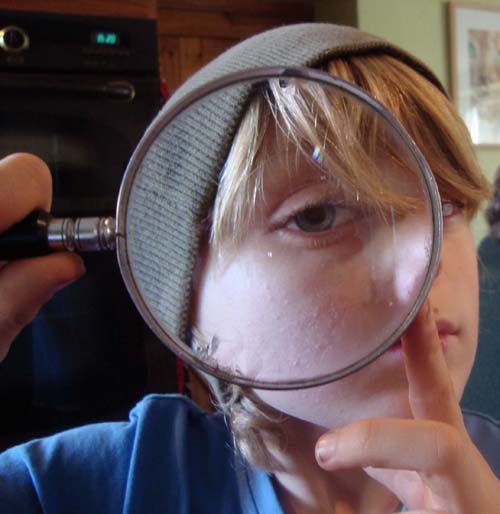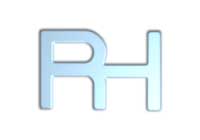

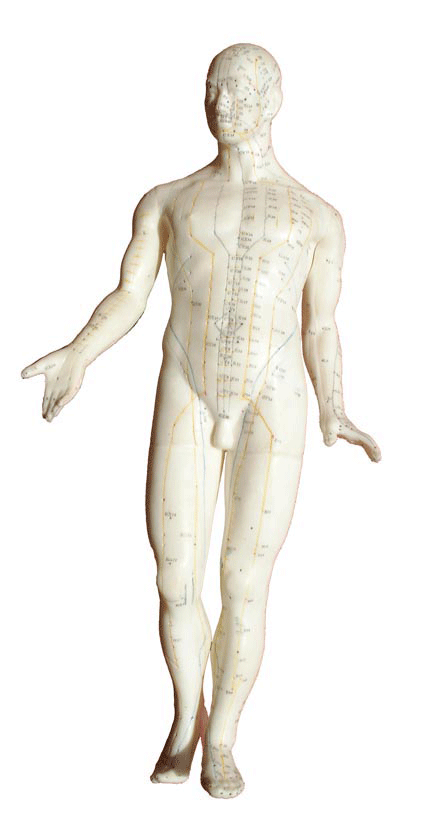 |
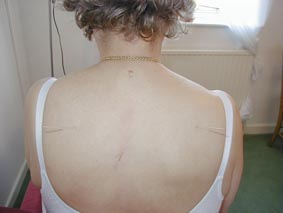 |
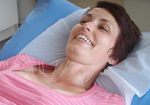 |
| Acu model | Back points | Resting |
Qi - life energy
Traditional acupuncture is based on the principle that our health depends on the balanced functioning of the body's energy known as 'Qi'. When we are in perfect health all the energy flows harmoniously throughout our body. When an illness arises this energy becomes disturbed and can manifest in a diverse array of symptoms. Acupuncture uses very fine needles to correct the flow of energy and when this is achieved systems are resolved.
What is acupuncture ?
Acupuncture is a system of healing which has been practiced in China and other Eastern countries for thousands of years. Although often described as a means of pain relief, it is in fact used to treat people with a wide range of illnesses. Its focus is on improving the overall well being of the patient, rather than the isolated treatment of specific symptoms. According to traditional Chinese philosophy, our health is dependent on the body's motivating energy - known as Qi - moving in a smooth and balanced way through a series of channels beneath the skin. Qi consists of equal and opposite qualities -Yin and Yang - and when these become unbalanced, illness may result. By inserting fine needles into the channels of energy, an acupuncturist can stimulate the body's own healing response and help restore its natural balance. The flow of Qi can be disturbed by a number of factors. These include emotional states such as anxiety, stress, anger, fear or grief, poor nutrition, weather conditions, hereditary factors, infections, poisons and trauma. The principal aim of acupuncture in treating the whole person is to recover the equilibrium between the physical, emotional and spiritual aspects of the individual.
Who has acupuncture ?
Many people come to acupuncture for help with specific symptoms or conditions. We are forbidden by the Advertising Standards Agency (March 2011) to state which conditions at present, apart from nausea, rheumatic pain, and tooth ache.
Some people may have acupuncture as a preventive measure to strengthen their constitution, or because they feel unwell in themselves without being 'ill' in the Western sense. It can also be used alongside conventional medicine in the treatment of both acute and chronic disease. As with any therapy, the response to acupuncture can vary from one person to another.
What does it feel like ?
Most people's experience of needles is of those used in injections and blood tests. Acupuncture needles bear little resemblance to these. They are much finer and are solid rather than hollow When the needle is inserted, the sensation is often described as a tingling or dull ache. Needles are inserted either for a second or two, or left in place for up to 20 minutes, depending on the effect required.
During treatment, patients commonly experience a heaviness in the limbs or a pleasant feeling of relaxation. The benefits of acupuncture frequently include more than just relief from a particular condition. Many people find that it can also lead to increased energy levels, better appetite and an enhanced sense of overall well being.
What will happen on my first visit ?
Your first consultation may be longer than subsequent sessions. An acupuncturist needs to assess our general state of health, in order to identifies the underlying pattern of disharmony and give you the most effective treatment. You will be asked about your current symptoms and what treatment you have received so far, your medical history and that of your close family, your diet, digestive system, sleeping patterns and emotional state.
To discover how the energies are flowing in your body the acupuncturist is likely to feel your pulses on both wrists, noting their quality, rhythm and strength. The structure, colour and coating of your tongue also gives a good guide to your physical health. Once enough information has been gathered to determine the likely causes of your problems, the acupuncturist can select the most appropriate treatment. The aim is to discover which energy channels need adjusting for your specific complaint to improve, and which require treatment to boost your overall energy and vitality. There are around 500 recognised acupuncture points on the body of which about 100 are most commonly used. Stimulation of specific areas on the skin affects the functioning of certain organs in the body. However, those areas may not be close to the part of the body where the problem is experienced. For example, although you may suffer from headaches, needles may be inserted in your foot or hand.
The acupuncturist may supplement the needle treatment with moxa, a smouldering herb which is used to warm acupuncture points to encourage the body's energy to flow smoothly. Other methods of stimulating acupuncture points include using lasers, pellets or electro-acupuncture. Massage or tapping with a rounded probe are techniques particularly suitable for small children or for people with a fear of needles.
How often will I need treatment ?
In traditional acupuncture philosophy each person is considered as unique, and therefore the number of treatments required depends on the individual. Some change is usually felt after five treatments. Normally you are recommended to visit your acupuncturist once or twice a week at first, although some conditions may need less frequent attention. Sometimes the effects of the treatment are dramatic, and only one or two treatments are required. With other patients, the effects are more subtle and they may need treatment over several months.
Should my doctor know ?
If you are receiving treatment from your doctor then it makes sense to tell him or her about your plans to have acupuncture. The acupuncture treatment may enable you to reduce or even stop taking some forms of medication, but your doctor should be consulted regarding any change of prescription. You should always tell your acupuncturist about any medication you are taking as this may affect your response to the acupuncture treatment.
Is it safe ?
All members of the British Acupuncture Council (BAcC) must observe a Code of Practice which lays down stringent standards of hygiene and sterilisation for needles and other equipment. These procedures have been approved by the Department of Health and provide protection against the transmission of infectious diseases. Patients who have been treated by a BAcC member are eligible to donate blood through the National Blood Service.
How can I find a qualified acupuncturist ?
David has been a qualified member of the British Acupuncture Council (BAcC) since 1987. Members of the BAcC have completed a thorough training of at least three years in traditional acupuncture and western medical sciences appropriate to the practice of acupuncture. They carry the letters MBAcC after their name, the BAcC maintains common standards of education, ethics, discipline and practice to ensure the health and safety of the public at all times. Members are covered by Professional Indemnity and Public Liability insurance. The British Acupuncture Council was formed in 1995 by the amalgamation of five separate organisations whose membership agreed that a single body should represent and govern its professionally qualified acupuncturists. The BAcC currently has more than 1,800 members whose details are published in an annual Register of Practitioner Members. A copy of the full Register can be obtained by sending a cheque for £3.50 to the address below Alternatively a list of practitioners in your local area can be requested free of charge.
For more information see the Contact & Links section
